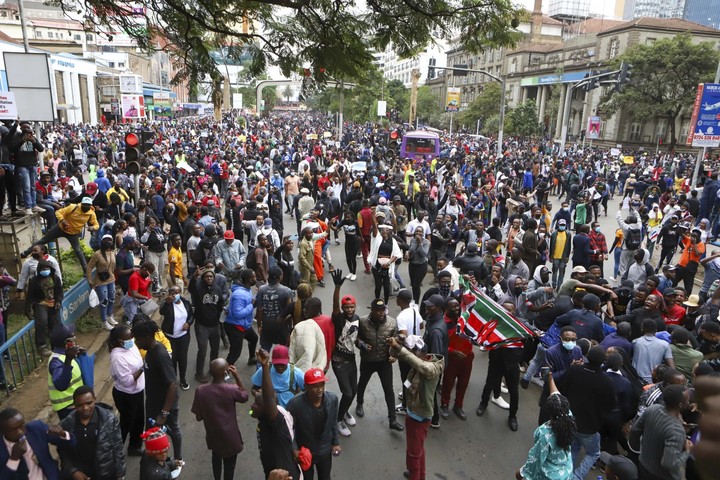Thousands Protest Against New Tax Proposals In Kenya, Nairobi on Standstill
Thousands of mostly young people demonstrated Thursday in Kenya’s capital, Nairobi, and across the country against new tax proposals introduced by President William Ruto’s administration in its annual budget legislation.
The protests paralyzed Nairobi’s central business district as horse-riding riot police deployed tear gas and water cannons against demonstrators advancing towards parliament buildings, where lawmakers were debating the finance bill.
Protesters, who initiated their demonstrations earlier in the week, are urging lawmakers to reject the legislation, which they argue will heavily burden salaried Kenyans, entrepreneurs, and consumers. They accuse Ruto of reneging on his promise to reduce taxes and lower the cost of living.
The proposed taxes include a 2.75% levy on income for the national medical insurance plan and increased taxes on vegetable oil and fuel, which would raise production costs and, consequently, consumer prices.
Although proposals to introduce a 16% value-added tax on bread and a new annual tax on motor vehicles were removed from the legislation on Tuesday following a meeting between Ruto and ruling party members, demonstrators insisted the amendments were insufficient and called for the total rejection of the budget legislation.
“Our parents have been taxed dry, yet there’s no development to show for it. We reject any additional taxes and will stay on the streets for as long as it takes,” said Ashley Mwai, a 19-year-old protester.
Businessman Walter Mwangi, 34, echoed her sentiment, saying taxes are already crippling his consultancy business. “We are sick and tired,” Mwangi said.
As lawmakers debated and voted on the legislation in its second reading, demonstrators attempted to breach a security cordon to access the parliament buildings, carrying anti-government placards and chanting slogans against Ruto.
Meanwhile, President Ruto attended a university event in Garissa, where anti-government protesters lined the street leading to the venue. Young people also demonstrated in Eldoret, the president’s hometown, expressing regret for having voted for Ruto.
Ruto acknowledged the constitutional right to protest but emphasized the role of government institutions in decision-making. “We are a democratic country. Those who want to demonstrate, it is their right, no problem. But decisions have to be made by institutions,” Ruto said on Wednesday.
Tuesday’s protests resulted in the arrest and subsequent release of more than 200 people. The right to protest is enshrined in the Kenyan constitution, requiring organizers to notify the police, who often grant permission unless there are security concerns. However, past anti-government protests in Nairobi have frequently been met with police force, including the use of live ammunition.











Add Comment